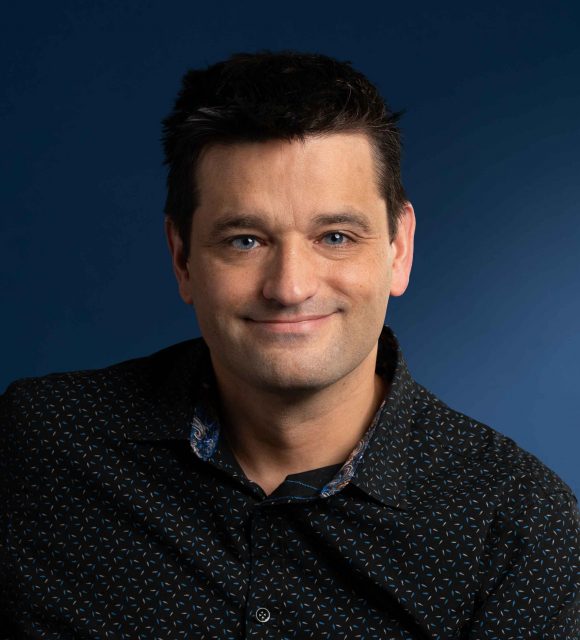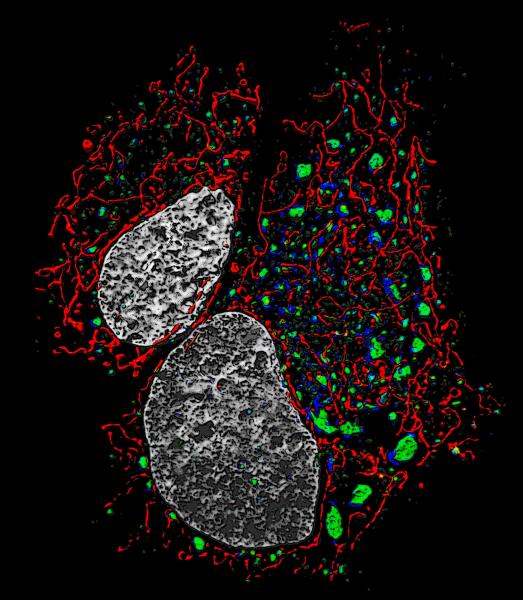
Areas of expertise
Molecular virology , Dengue virus , Virus-host interactions , Zika virus
- Associate Professor
- Scientific Director of the Containment level 3 laboratory
Phone
450-687-5010 poste 8898
E-mail
Laurent.Chatel-Chaix@inrs.ca
Armand-Frappier Santé Biotechnologie Research Centre
531 des Prairies Blvd.
Laval (Quebec) H7V 1B7
CANADA
Research interests
Infection with Dengue virus (DENV) represents a major public health concern since it causes the most prevalent arthropod-borne viral disease with an estimated 400 million individuals infected each year. More recently, the closely related Zika virus (ZIKV) emerged as a global priority since its infection can cause Guillain-Barré syndrome and severe microcephaly in newborns while it is transmissible both sexually and congenitally in addition to infection by mosquito bites.
DENV and ZIKV are of particular interest both at the fundamental and clinical levels. Indeed, the mechanistic details known about their life cycle remain enigmatic and as a result, no antivirals or prophylactic vaccines are available against these important emerging diseases.
With the aim to better understand the pathogeneses of DENV and ZIKV and to identify novel antiviral targets, my research group concentrates its work on the molecular biology of DENV, ZIKV as well as of other Flaviviridae. More specifically, we aim at discovering novel virus/host interactions engaged in the functional and morphological hijacking of specific cellular machineries by the viral replication factories. Such research encompasses the study of various biological processes such as innate immunity, mitochondria functions, intracellular calcium homeostasis or RNA metabolism.
Publications
Chatel-Chaix L*,Cortese M, Romero-Brey I, Bender S, Neufeldt CJ, Fischl W, Scaturro P, Schieber N, Schwab Y, Fischer B, Ruggieri A, Bartenschlager R*.
Dengue Virus Perturbs Mitochondrial Morphodynamics to Dampen Innate Immune Responses.
Cell Host & Microbe (2016) http://dx.doi.org/10.1016/j.chom.2016.07.008. (* Co-corresponding authors)
Tremblay N, Baril M, Chatel-Chaix L, Es-Saad S, Park AY, Koenekoop RK, Lamarre D.
Spliceosome SNRNP200 Promotes Viral RNA Sensing and IRF3 Activation of Antiviral Response.
PLoS Pathogens (2016) 12(7):e1005772.
Scaturro P, Cortese M, Chatel-Chaix L, Fischl W, Bartenschlager R.
Dengue Virus Non-structural Protein 1 Modulates Infectious Particle Production via Interaction with the Structural Proteins.
PLoS Pathogens (2015) 11(11):e1005277.
Chatel-Chaix L*,Fischl W*, Scaturro P, Cortese M, Kallis S, Bartenschlager M, Fischer B, Bartenschlager R.
A Combined Genetic-Proteomic Approach Identifies Residues within Dengue Virus NS4B Critical for Interaction with NS3 and Viral Replication.
Journal of Virology (2015) 89(14): 7170-86. (* Equal contributions).
Metz P, Chiramel A, Chatel-Chaix L, Alvisi G, Bankhead P, Mora-Rodríguez R, Long G, Hamacher-Brady A, Brady NR, Bartenschlager R.
Dengue virus inhibition of autophagic flux and dependency of viral replication on proteasomal degradation of the autophagy receptor p62.
Journal of Virology (2015) 89(14): 7170-7186.
Chatel-Chaix L,Bartenschlager R.
A monocytic detour to replicate patient-derived hepatitis C virus in hepatoma cells and its use for phenotypic analyses.
Hepatology (2015) 61(4): 1112-4. (Comment)
Chatel-Chaix L,Bartenschlager R.
Dengue virus- and hepatitis C virus-induced replication and assembly compartments: the enemy inside-caught in the web.
Journal of Virology (2014) 88(11): 5907-11. (Review)
Germain MA, Chatel-Chaix L, Gagné B, Bonneil É, Thibault P, Pradezynski F, de Chassey B, Meyniel-Schicklin L, Lotteau V, Baril M, Lamarre D.
Elucidating novel hepatitis C virus-host interactions using combined mass spectrometry and functional genomics approaches.
Molecular and Cellular Proteomics (2014) 13(1): 184-203.
Chatel-Chaix L,Germain MA, Motorina A, Bonneil É, Thibault P, Baril M, Lamarre D.
A host YB-1 ribonucleoprotein complex is hijacked by hepatitis C virus for the control of NS3-dependent particle production.
Journal of Virology (2013) 87(21): 11704-20.
Baril M, Es-Saad S, Chatel-Chaix L, Fink K, Pham T, Raymond VA, Audette K, Guenier AS, Duchaine J, Servant M, Bilodeau M, Cohen E, Grandvaux N, Lamarre D.
Genome-wide RNAi screen reveals a new role of a WNT/CTNNB1 signaling pathway as negative regulator of virus-induced innate immune responses.
PLoS Pathogens (2013) 9(6): e1003416.
Chatel-Chaix L,Germain MA, Götte M, Lamarre D.
Direct-acting and host-targeting HCV inhibitors: current and future directions.
Current Opinion in Virology (2012) 2(5): 588-98. (Review)
Jouan L, Chatel-Chaix L, Melançon P, Rodrigue-Gervais IG, Raymond VA, Selliah S, Bilodeau M,Grandvaux N, Lamarre D.
Targeted impairment of innate antiviral responses in the liver of chronic hepatitis C patients.
Journal of Hepatology (2012) 56(1): 70-7.
Chatel-Chaix L,Melançon P, Racine MÈ, Baril M, Lamarre D.
Y-box-binding protein 1 interacts with hepatitis C virus NS3/4A and influences the equilibrium between viral RNA replication and infectious particle production.
Journal of Virology (2011) 85(21): 11022-37.
Chatel-Chaix L*,Baril M*, Lamarre D.
Pharmacology and mechanisms of action of antiviral drugs: Protease inhibitors.
Advanced Therapy for Hepatitis C. (2011) 53-59. (Book Chapter) (* Equal contributions)
Chatel-Chaix L*,Baril M*, Lamarre D.
Hepatitis C Virus NS3/4A Protease Inhibitors: A Light at the End of the Tunnel.
Viruses. (2010) 2(8): 1752-65. (Review) (* Equal contributions)
Abrahamyan LG, Chatel-Chaix L, Ajamian L, Milev MP, Monette A, Clément JF, Song R, Lehmann M, DesGroseillers L, Laughrea M, Boccaccio G, Mouland AJ.
Novel Staufen1 ribonucleoproteins prevent formation of stress granules but favour encapsidation of HIV-1 genomic RNA.
Journal of Cell Science (2010) 123(3): 369-83.
Chatel-Chaix L, Boulay K, Mouland, AJ, DesGroseillers L.
The host protein Staufen1 interacts with the pr55Gag zinc fingers and regulates HIV-1 assembly via its N-terminus.
Retrovirology (2008) 5, 41.
Chatel-Chaix L, Abrahamyan L, Fréchina C, Mouland AJ, DesGroseillers L.
The host protein Staufen1 participates in HIV-1 assembly in live cells by influencing pr55Gag multimerization.
Journal of Virology (2007) 81, 6216-6230.
Levesque K, Halvorsen M, Abrahamyan L, Chatel-Chaix L, Poupon V, Gordon H, DesGroseillers L, Gatignol A, Mouland AJ.
Trafficking of HIV-1 RNA is mediated by heterogeneous nuclear ribonucleoprotein A2 expression and impacts on viral assembly.
Traffic (2006) 7, 1177-1193.
Dugré-Brisson S, Elvira G, Boulay K, Chatel-Chaix L, Mouland AJ, DesGroseillers L.
Interaction of Staufen1 with the 5′ end of mRNA facilitates translation of these RNAs.
Nucleic Acids Research (2005) 33, 4797-4812.
Chatel-Chaix L, Clement JF, Martel C, Beriault V, Gatignol A, DesGroseillers L, Mouland AJ.
Identification of Staufen in the human immunodeficiency virus type 1 Gag ribonucleoprotein complex and a role in generating infectious viral particles.
Molecular and Cellular Biology(2004) 24, 2637-2648.



